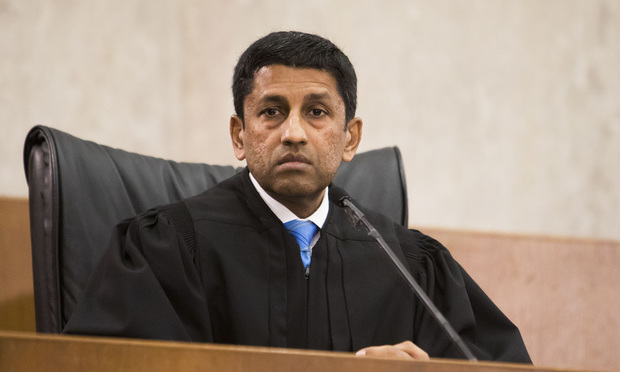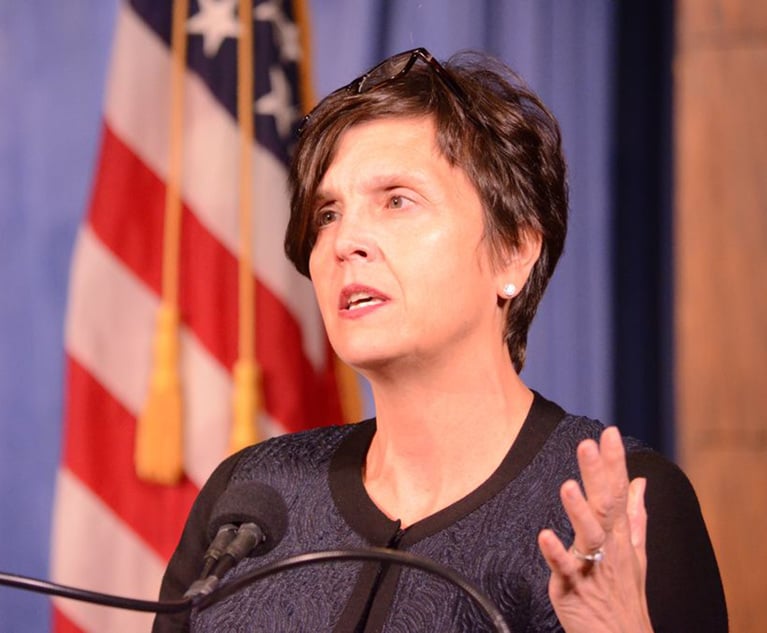Merrick Garland's Time as Chief Judge of the DC Circuit Is Ending. Sri Srinivasan Is Up Next.
Garland will remain on the bench as Srinivasan becomes the first Asian to serve as the chief judge for a circuit court in the United States.
January 24, 2020 at 03:20 PM
6 minute read
 Judge Sri Srinivasan, of the U.S. District Court for the District of Columbia. Dec. 14, 2017. Photo: Diego M. Radzinschi / NLJ
Judge Sri Srinivasan, of the U.S. District Court for the District of Columbia. Dec. 14, 2017. Photo: Diego M. Radzinschi / NLJ
For Chief Judge Merrick Garland, the past few years have been far from quiet. He's been nominated for a seat on the U.S. Supreme Court, going through the grueling vetting process only to have his nomination blocked and his hopes of a seat on the high court dashed.
After his return to the U.S. Court of Appeals for the D.C. Circuit, he's handled a full caseload, overseen the creation of committees and protocols on workplace conduct, and still found time to tutor at a D.C. high school.
But come Feb. 12, his term as chief judge on the powerful appellate court will come to an end. According to circuit court rules, which require the most senior judge under the age of 65 to serve as chief judge, Judge Sri Srinivasan will take on the title. He will be the first Asian to serve as the chief judge for a circuit court in the United States.
Garland, 67, who was not available for an interview, is well-known for his brush with a Supreme Court seat. His name has become a rallying cry whenever critics view actions by the GOP-controlled Senate as similar acts of obstruction, or when Senate Majority Leader Mitch McConnell chimes in on how he'd act on a potential Supreme Court vacancy in another election year.
But at the court, Garland has quietly worked on ways to improve not just the D.C. Circuit, but federal courts as a whole, as chair of the federal judiciary's policymaking group, the Judicial Conference.
Under Garland's watch, the D.C. Circuit has taken steps toward transparency. It's one of a few appeals courts that livestreams oral arguments on its website, meaning those who aren't able to get a seat in the courtroom can still hear the judges preside over cases that often involve the federal government and its policies.
He also created a working group to solicit recommendations from staff on how to address workplace misconduct at the federal courthouse in D.C., and implemented policies on the topic.
And Garland, a Clinton appointee, helped raise cybersecurity as an issue for federal courts, a topic that hadn't had serious consideration in the past. The D.C. Circuit has also added its own IT person to address those issues.
And he's earned praise from members of the court with whom he would have sat alongside: Chief Justice John Roberts gave Garland a shout-out for tutoring students at J.O. Wilson Elementary School in D.C. in the justice's most recent end-of-the-year report.
Garland will still be an active judge and hear cases at the D.C. Circuit, but without the administrative tasks on his desk.
His former clerks widely praised Garland at the time of his Supreme Court nomination, describing him as taking an active interest in their personal lives and showing genuine respect toward lawyers who argued before him in court.
Rachel Miller-Ziegler, an associate with Munger, Tolles & Olson who clerked for Garland at the time of the nomination, said she was initially intimidated at the prospect of working for a federal judge with Garland's reputation. But those concerns quickly wore off.
Miller-Ziegler said that she and Garland have stayed in touch since her clerkship ended, speaking over the phone every couple of months. She said Garland is often how she learns about updates in the personal lives of his other former clerks, an indication of the significant network he's created and remained active in over the years.
She said Garland has a deep faith in the power of the federal judiciary, and that he tries to exemplify that in his work at the court.
"He has a lot of faith in the government and the federal judiciary, and he wants the public to have that faith," Miller-Ziegler said
Srinivasan
While Srinivasan, an Obama appointee, is not a purposeful choice for chief judgeship, having a person of color sitting at the top of such a prominent appellate court is likely to give a boost to diversity in the federal judiciary, which has been criticized for being predominantly male and white (judicial selections are, of course, made at the whim of the president).
It also means that Srinivasan will now sit on the Judicial Conference of the United States, the policymaking body for the federal judiciary. The conference has recently taken up reviews on workplace misconduct, like sexual harassment, within the courts.
On top of making decisions that could help advance the D.C. Circuit on technology and transparency, the chief judgeship will also put Srinivasan in a spot to weigh in on similar decisions for the entire federal judiciary.
And for a judge who has already been considered for a Supreme Court seat, the title could give his resume a boost, if another vacancy emerges on the court under a president who's willing to appoint Srinivasan.
He won't be without institutional support, as Garland will still be on the court. Srinivasan will also inherit at least one of Garland's staff members, special assistant to the chief judge Tracy Scarrow, who has worked for two other chief judges at the D.C. Circuit as well.
A former clerk said Srinivasan, 52, is already viewed as a leader at the D.C. Circuit, where he will have the opportunity to make decisions on the future of the court, at least when it comes to administrative and transparency issues.
The ex-clerk said that Srinivasan isn't the type to try and enact changes at the court for the sake of it, or because he believes it's the modern thing to do, or because others say he should.
"I do think he has a very precise way of thinking through things and figuring out problems that generally leans to something innovative," the former clerk said.
Srinivasan, who grew up playing basketball in Kansas, is also described as an approachable judge who's more than willing to talk about University of Kansas basketball and text his former clerks about their own college teams.
John Yang, the president and executive director of Asian Americans Advancing Justice, said Srinivasan's new title might help inspire other people of color to pursue careers in the legal community.
And he said that Srinivasan's quick wit and personality "helps him forge alliances and build consensus in ways that others might not be able to."
"The manner in which he relates to people, the manner in which he is down to earth, will serve him well in this role," Yang said.
This content has been archived. It is available through our partners, LexisNexis® and Bloomberg Law.
To view this content, please continue to their sites.
Not a Lexis Subscriber?
Subscribe Now
Not a Bloomberg Law Subscriber?
Subscribe Now
NOT FOR REPRINT
© 2025 ALM Global, LLC, All Rights Reserved. Request academic re-use from www.copyright.com. All other uses, submit a request to [email protected]. For more information visit Asset & Logo Licensing.
You Might Like
View All
Skadden and Steptoe, Defending Amex GBT, Blasts Biden DOJ's Antitrust Lawsuit Over Merger Proposal
4 minute read
'Lack of Independence' or 'Tethered to the Law'? Witnesses Speak on Bondi
4 minute read
Trending Stories
- 1Settlement Allows Spouses of U.S. Citizens to Reopen Removal Proceedings
- 2CFPB Resolves Flurry of Enforcement Actions in Biden's Final Week
- 3Judge Orders SoCal Edison to Preserve Evidence Relating to Los Angeles Wildfires
- 4Legal Community Luminaries Honored at New York State Bar Association’s Annual Meeting
- 5The Week in Data Jan. 21: A Look at Legal Industry Trends by the Numbers
Who Got The Work
J. Brugh Lower of Gibbons has entered an appearance for industrial equipment supplier Devco Corporation in a pending trademark infringement lawsuit. The suit, accusing the defendant of selling knock-off Graco products, was filed Dec. 18 in New Jersey District Court by Rivkin Radler on behalf of Graco Inc. and Graco Minnesota. The case, assigned to U.S. District Judge Zahid N. Quraishi, is 3:24-cv-11294, Graco Inc. et al v. Devco Corporation.
Who Got The Work
Rebecca Maller-Stein and Kent A. Yalowitz of Arnold & Porter Kaye Scholer have entered their appearances for Hanaco Venture Capital and its executives, Lior Prosor and David Frankel, in a pending securities lawsuit. The action, filed on Dec. 24 in New York Southern District Court by Zell, Aron & Co. on behalf of Goldeneye Advisors, accuses the defendants of negligently and fraudulently managing the plaintiff's $1 million investment. The case, assigned to U.S. District Judge Vernon S. Broderick, is 1:24-cv-09918, Goldeneye Advisors, LLC v. Hanaco Venture Capital, Ltd. et al.
Who Got The Work
Attorneys from A&O Shearman has stepped in as defense counsel for Toronto-Dominion Bank and other defendants in a pending securities class action. The suit, filed Dec. 11 in New York Southern District Court by Bleichmar Fonti & Auld, accuses the defendants of concealing the bank's 'pervasive' deficiencies in regards to its compliance with the Bank Secrecy Act and the quality of its anti-money laundering controls. The case, assigned to U.S. District Judge Arun Subramanian, is 1:24-cv-09445, Gonzalez v. The Toronto-Dominion Bank et al.
Who Got The Work
Crown Castle International, a Pennsylvania company providing shared communications infrastructure, has turned to Luke D. Wolf of Gordon Rees Scully Mansukhani to fend off a pending breach-of-contract lawsuit. The court action, filed Nov. 25 in Michigan Eastern District Court by Hooper Hathaway PC on behalf of The Town Residences LLC, accuses Crown Castle of failing to transfer approximately $30,000 in utility payments from T-Mobile in breach of a roof-top lease and assignment agreement. The case, assigned to U.S. District Judge Susan K. Declercq, is 2:24-cv-13131, The Town Residences LLC v. T-Mobile US, Inc. et al.
Who Got The Work
Wilfred P. Coronato and Daniel M. Schwartz of McCarter & English have stepped in as defense counsel to Electrolux Home Products Inc. in a pending product liability lawsuit. The court action, filed Nov. 26 in New York Eastern District Court by Poulos Lopiccolo PC and Nagel Rice LLP on behalf of David Stern, alleges that the defendant's refrigerators’ drawers and shelving repeatedly break and fall apart within months after purchase. The case, assigned to U.S. District Judge Joan M. Azrack, is 2:24-cv-08204, Stern v. Electrolux Home Products, Inc.
Featured Firms
Law Offices of Gary Martin Hays & Associates, P.C.
(470) 294-1674
Law Offices of Mark E. Salomone
(857) 444-6468
Smith & Hassler
(713) 739-1250











